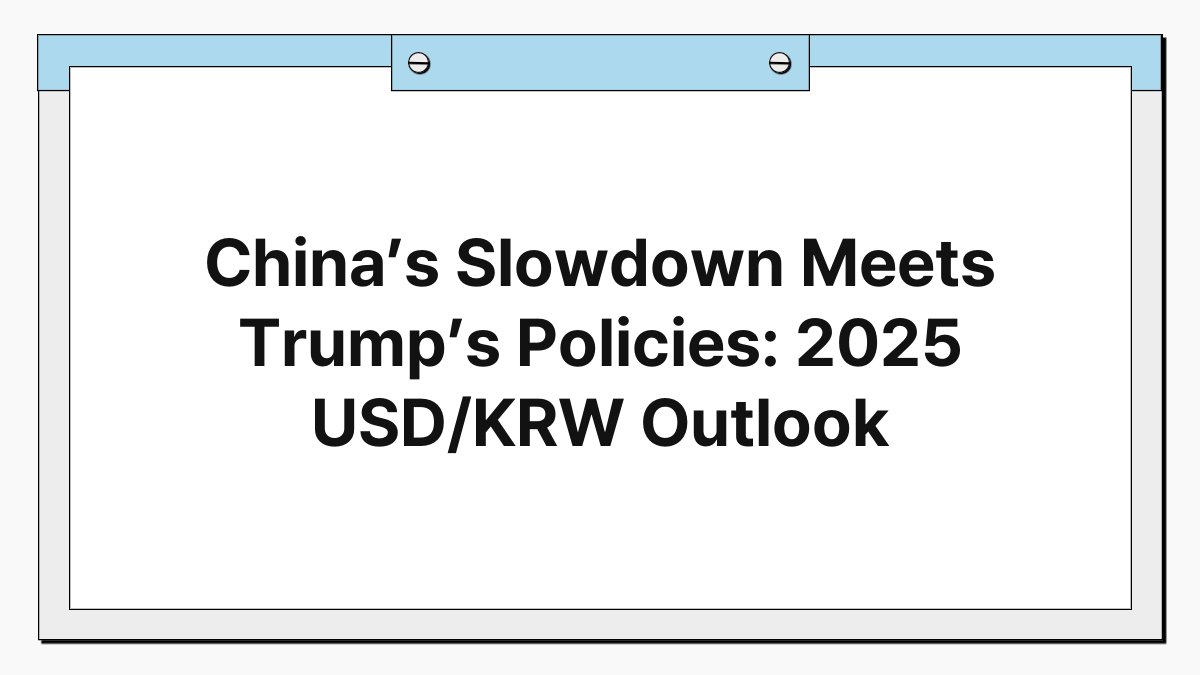[K-Bridge/Samuel] China’s Slowdown Meets Trump’s Policies: 2025 USD/KRW Outlook is a critical examination of how the economic deceleration in China intersects with the policies implemented during Donald Trump’s presidency.
As global economies become increasingly interconnected, shifts in one major economy can have profound effects on others, particularly in the context of currency exchange rates.
The USD/KRW exchange rate, which indicates the value of the US dollar against the South Korean won, serves as a barometer for understanding these dynamics.
This analysis will provide insights into the potential implications of China’s economic slowdown and Trump’s policies on the USD/KRW outlook for 2025.
Through this article, readers will gain an understanding of the factors influencing the USD/KRW exchange rate, the impact of China’s economic performance, and the ramifications of Trump’s policies on the global economy.
Additionally, insights into future trends and predictions will be discussed, equipping readers with knowledge to navigate the complexities of international finance.
The Impact of China’s Economic Slowdown on Global Markets
Understanding China’s Economic Landscape
China has long been regarded as a global economic powerhouse, but recent indicators suggest a slowdown in its growth trajectory.
The factors contributing to this deceleration include demographic shifts, rising debt levels, and ongoing trade tensions.
As China’s economy matures, the rapid growth rates that characterized its ascent are becoming increasingly difficult to maintain.
This economic slowdown is not merely a domestic issue; it reverberates through global markets, impacting trade relationships and investment flows.
The implications of China’s economic performance are particularly pronounced in countries that have strong trade ties with it, including South Korea.
As China reduces its demand for imports, South Korean exports may decline, leading to a ripple effect on the Korean economy.
This situation could put downward pressure on the Korean won, affecting the USD/KRW exchange rate.
The interconnectedness of global economies means that shifts in China’s economy can lead to significant fluctuations in currency values, impacting international trade and investment strategies.
Moreover, the slowdown in China raises concerns about global supply chains.
Many companies rely on Chinese manufacturing, and any disruptions could lead to increased costs and delays.
As businesses reassess their supply chains, the potential for increased inflation in other economies, including South Korea, becomes a real concern.
The overall impact of China’s economic slowdown on global markets is multifaceted, influencing everything from consumer prices to investment strategies.
Currency Fluctuations and Economic Interdependence
The relationship between China’s economic performance and currency fluctuations is a critical aspect of international finance.
As China’s growth slows, investors may seek safer assets, often turning to the US dollar.
This shift can lead to an appreciation of the dollar against other currencies, including the South Korean won.
The dynamics of currency trading are influenced by a variety of factors, including interest rates, inflation, and economic stability.
Additionally, the economic interdependence between China and South Korea means that any downturn in China’s economy can have immediate consequences for the Korean currency.
As South Korean exports decline due to reduced Chinese demand, the won may weaken against the dollar.
This scenario could lead to increased costs for imports, further complicating the economic landscape in South Korea.
Currency fluctuations can create uncertainty for businesses and investors, making it essential to monitor these trends closely.
The interplay between currency values and economic performance underscores the importance of understanding global economic trends.
As investors navigate these complexities, the ability to anticipate shifts in currency values becomes a strategic advantage.
The outlook for the USD/KRW exchange rate in the wake of China’s economic slowdown is a crucial consideration for anyone engaged in international finance.
Trump’s Policies and Their Influence on Currency Markets
Analyzing Trump’s Economic Policies
The policies enacted during Donald Trump’s presidency have significantly influenced the global economic landscape, particularly in relation to trade and currency markets.
Trump’s approach to international trade, characterized by protectionist measures, has led to increased tariffs and trade tensions, notably with China.
These policies have not only affected bilateral trade but have also had broader implications for currency values, including the USD/KRW exchange rate.
One of the key aspects of Trump’s economic policies was the emphasis on “America First,” which aimed to bolster domestic industries at the expense of international cooperation.
This shift in trade policy has created uncertainty in global markets, prompting investors to reassess their strategies.
As the US dollar is often seen as a safe haven, any uncertainty can lead to fluctuations in its value against other currencies, including the won.
Furthermore, Trump’s fiscal policies, including tax cuts and increased government spending, have implications for inflation and interest rates.
As the US economy responds to these policies, the Federal Reserve may adjust monetary policy, influencing the strength of the dollar.
The interconnectedness of these factors means that Trump’s policies could have lasting effects on the USD/KRW exchange rate, particularly in the context of a slowing Chinese economy.
The Role of Trade Tensions in Currency Valuation
Trade tensions between the US and China have led to significant volatility in currency markets.
As tariffs and trade barriers increase, the economic outlook for both countries becomes uncertain.
This uncertainty can lead to fluctuations in currency values, with investors seeking refuge in the US dollar.
The impact of these trade tensions on the USD/KRW exchange rate is particularly relevant for South Korea, given its reliance on exports.
When trade tensions escalate, the South Korean economy may suffer due to decreased demand for its exports.
As a result, the won could weaken against the dollar, reflecting the economic challenges faced by South Korean businesses.
The ongoing trade disputes also create an environment of unpredictability, making it essential for investors to stay informed about developments in US-China relations.
The influence of trade tensions on currency valuation underscores the importance of monitoring geopolitical developments.
As the landscape evolves, the potential for further fluctuations in the USD/KRW exchange rate remains high.
Understanding the interplay between trade policies and currency markets will be crucial for navigating the complexities of international finance in the coming years.
Future Trends in the USD/KRW Exchange Rate
Projections for 2025: Economic Indicators
As we look ahead to 2025, several economic indicators will shape the outlook for the USD/KRW exchange rate.
Factors such as GDP growth, inflation rates, and trade balances will play a pivotal role in determining the future trajectory of the won against the dollar.
Analysts will closely monitor these indicators to assess the overall health of the South Korean economy in the context of global economic trends.
The potential for a rebound in China’s economy could influence the USD/KRW exchange rate positively.
If China manages to stabilize its growth, demand for South Korean exports may increase, supporting the won.
Conversely, if the slowdown persists, the pressure on the won could continue, leading to a weaker currency against the dollar.
Additionally, the impact of global economic recovery following the pandemic will also be a significant factor.
As economies around the world strive to return to pre-pandemic levels, the dynamics of trade and investment will shift.
The USD/KRW exchange rate will be influenced by these developments, highlighting the need for continuous monitoring of economic indicators.
The Importance of Geopolitical Stability
Geopolitical stability is a crucial factor influencing the USD/KRW exchange rate.
As tensions between nations fluctuate, the perception of risk in financial markets can lead to significant currency movements.
For South Korea, its proximity to North Korea and ongoing regional tensions can create an environment of uncertainty, impacting investor sentiment.
The potential for diplomatic breakthroughs or escalations in regional conflicts can influence the stability of the won.
In times of heightened geopolitical risk, investors may flock to the safety of the US dollar, leading to fluctuations in the USD/KRW exchange rate.
Understanding the geopolitical landscape will be essential for forecasting currency trends in the coming years.
Furthermore, the role of international alliances and partnerships cannot be overlooked.
As South Korea navigates its relationships with major economies, including the US and China, these dynamics will play a pivotal role in shaping the future of the won.
The interplay between geopolitical stability and currency valuation underscores the complexities of international finance.
Conclusion: Navigating Uncertainty in Currency Markets
As we analyze the intersection of China’s economic slowdown and Trump’s policies, it becomes clear that the future of the USD/KRW exchange rate is fraught with uncertainty.
The interconnectedness of global economies means that shifts in one area can have far-reaching implications for others.
Understanding the dynamics at play will be essential for investors and businesses looking to navigate these complexities.
The potential for fluctuations in the USD/KRW exchange rate highlights the importance of staying informed about economic trends and geopolitical developments.
As we approach 2025, the ability to anticipate changes in currency values will be a strategic advantage for those engaged in international finance.
By remaining vigilant and adaptable, stakeholders can position themselves to thrive in an ever-evolving economic landscape.








